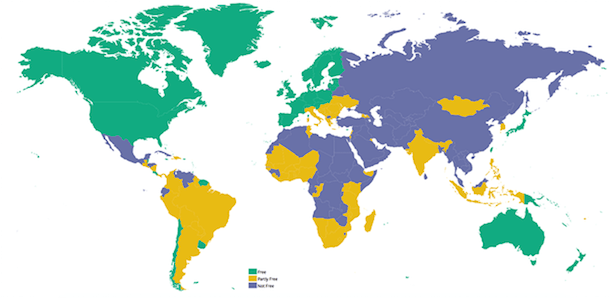Tuesday is World #PressFreedom Day! Info from @UNESCO is here: https://t.co/lFUOLYDMUr #WPFD2016 pic.twitter.com/KleHaYvWCV
— United Nations (@UN) May 3, 2016
Today marks World Press Freedom Day, a vital concept that has grown in recognition over the centuries.
- Two hundred and fifty years ago, in what is now Sweden and Finland, a historic milestone was reached that was quiet enough to not to be taught in your classroom but loud enough that you can still hear its repercussions worldwide today: The first freedom of information law was passed, giving citizens the right to express themselves without government interference and that information held by the state should be available to its citizens.
- Sixty-seven years ago, countries around the world ratified the United Nations General Assembly’s Universal Declaration of Human Rights, which stated that: “Everyone has the right to freedom of opinion and expression; this right includes freedom to hold opinions without interference and to seek, receive and impart information and ideas through any media and regardless of frontiers.”
- Twenty-five years ago, another milestone was reached in Namibia: The Windhoek Declaration of Press Freedom was adopted, which paved the way for the UN General Assembly to declare May 3 as World Press Freedom Day – a reminder that freedom of information is a human right and we must protect press freedom.
This day is about more than observation; it’s about action.
According to Freedom House’s Freedom of the Press 2016 report, “forty-one percent of the world’s population has a Partly Free press, and 46 percent live in Not Free media environments.” In other words, only 13 percent of the world’s population lives in a free media environment. This is unacceptable.

Press freedom is an important indicator of a country’s embrace of human rights and rule of law. The Fund for Peace’s annual Fragile Sates Index looks at press freedom as it assesses countries’ risk of instability.
It’s clear that a free press – and journalists that can do their job freely and safely – are vital to national and global stability.
One of the themes UNESCO is promoting for this year’s World Press Freedom Day is ensuring the safety of journalists, both online and offline. The age of technology and social media has been both a blessing and a challenge, facilitating the spread of news and ideas but also acts such as cyber-crime and harassment.
In many of the countries today where press is not free, unjust prison sentences, censorship, intimidation, and even death continue to be barriers to open public discourse. The world can, and must, do better to protect journalists. And we must honor and remember those who have been abused or died in witness during their journalistic careers.
The weight of this issue is heavy, and one we must address as communicators in the sometimes difficult international environment. But it is worth ending on an optimistic note.
If history is any indication, progress on this issue can continue to be made. Freedom of information is key to the ambitious new Sustainable Development Goals adopted in 2015, which create a shared agenda to promote opportunity and dignity for all people.
In the words of UNESCO, free journalism “demonstrates freedom of expression for societies at large, it puts new questions on the development agenda, and it empowers citizens with information.” Strengthening press freedom and a culture that embraces diversity of opinion is critical to creating more democratic and open societies. Good journalism is essential to the success of the global goals, so let us continue to amplify this message while both celebrating and remembering the importance of this day. This is our right!
VIDEO: Ginna Morelo talks the challenges to access information 4 women journalists. https://t.co/7YmYr0cOG5 #WPFD2016
— UNESCO (@UNESCO) May 3, 2016



 View All Blog Posts
View All Blog Posts